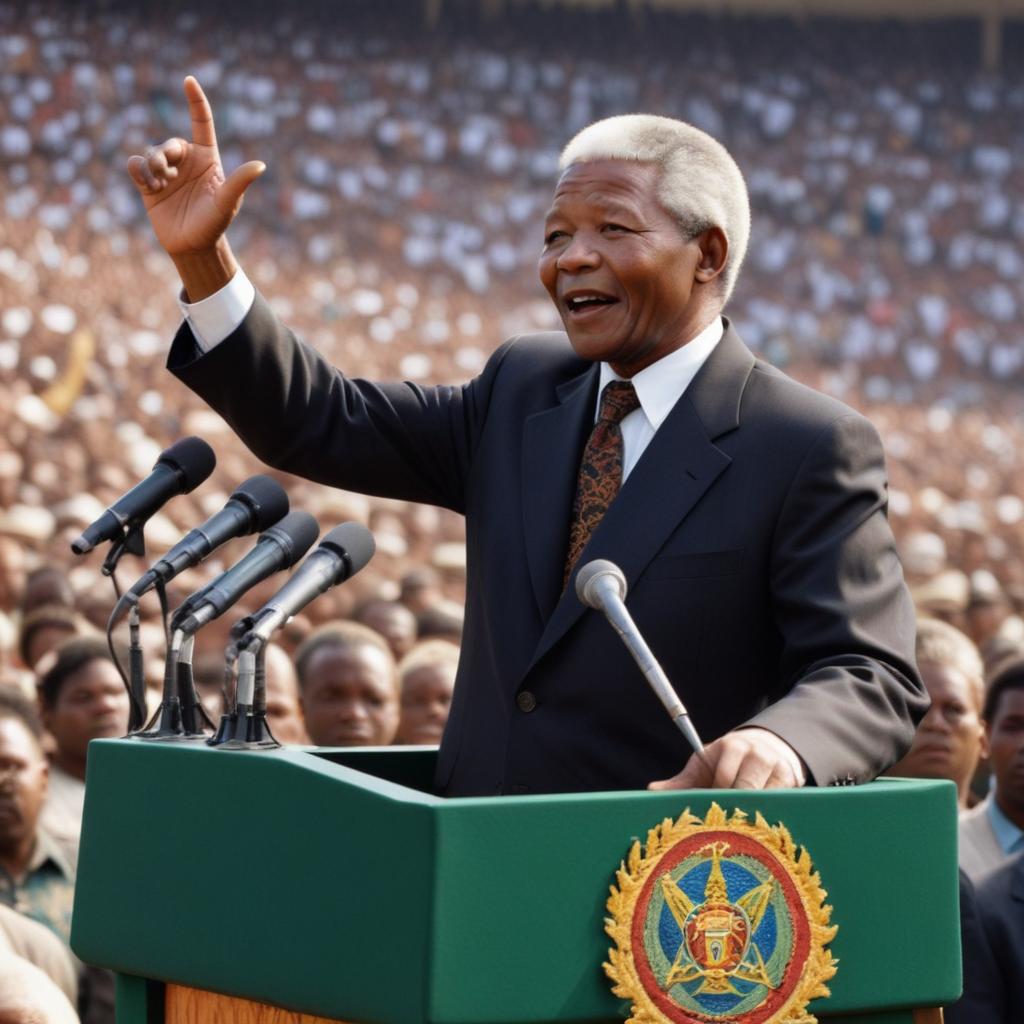Class 10 English Chapter 2 Nelson Mandela, is prepared by expert Teachers of kjv
Nelson Mandela: Long Walk to Freedom
Questions Answers
1. Where did the ceremonies take place? Can you name any public buildings in India that are made of sandstone?
Ans: The ceremonies happened at the Union Buildings in Pretoria, South Africa.
Some buildings in India made of sandstone are the Red Fort, Parliament House, and Rashtrapati Bhavan.
2. Can you say how 10 May is an ‘autumn day’ in South Africa?
Answer: The 10th of May is an autumn day in South Africa because it marks the historic start of the country’s first democratic, non-racial government.
3. At the beginning of his speech, Mandela mentions “an extraordinary human disaster”. What does he mean by this? What is the “glorious … human achievement” he speaks of at the end?
Answer: Mandela calls the apartheid system a big and terrible problem for humans. The “glorious human achievement” he talks about is ending apartheid and building a country where everyone is treated equally.
4. What does Mandela thank the international leaders for?
Answer: Mandela thanked the international leaders for attending the ceremony, which showed support for South Africa’s new democracy and a shared victory for justice and dignity.
Class 10 English Chapter 2 Nelson Mandela
5. What ideals does he set out for the future of South Africa?
Answer: Nelson Mandela set the ideals of ending poverty, deprivation, and suffering. He also dreamed of a country where no one is judged by their color or gender.
Oral Comprehension Check
1. What do the military generals do? How has their attitude changed, and why?
Answer: The military generals saluted Mandela and promised to be loyal to him. Earlier, they used to arrest Black people, but now they showed respect because South Africa had become free and fair.
2. Why were two national anthems sung?
Ans: On the day of the inauguration, two national anthems were sung, one by the whites and the other by the blacks. This symbolized the equality of blacks and whites.
3. How does Mandela describe the systems of government in his country
(i) in the first decade, and (ii) in the final decade, of the twentieth century?
Ans:- The systems of government described by Mandela are given below—
(i) In the first decade of the twentieth century, South Africa had a system of racial domination by white people.
(ii) In the final decade, this system was replaced by one that recognized the rights and freedom of everyone, regardless of color.
4. What does courage mean to Mandela?
Ans:- According to Mandela, Courage doesn’t mean having no fear. It means being able to face and overcome fear. He believes that brave people aren’t fearless but can control their fear.
5. Which does he think is natural, to love or to hate?
Ans:- For Mandela, love comes more naturally to the human heart then hate.
Oral Comprehension Check
1. What “twin obligations” does Mandela mention?
Ans:- Mandela believes that every man has twin obligations. The first is to his family, parents, wife, and children, the second obligation is to his people, his community, and his country.
2. What did being free mean to Mandela as a boy, and as a student? How does he contrast these “transitory freedoms” with “the basic and honourable freedoms”?
Answer: As a boy, Mandela thought being free meant playing outside, swimming, and staying out late. As a student, he thought it meant doing what he wanted and reading whatever he liked. But later, he realized these were just “temporary freedoms.” Real freedom, he says, is about dignity, equality, and the right to live without fear or discrimination.
3. Does Mandela think the oppressor is free? Why/Why not.
Ans:- Mandela doesn’t think the oppressor is free. He believes they are trapped by hatred, unfairness, and closed-minded thinking. He understands that both the oppressor and the oppressed lose their humanity and peace.
Nelson Mandela: Long Walk to Freedom
Thinking about the Text
1. Why did such a large number of international leaders attend the inauguration? What did it signify the triumph of?
Answer: A large number of international leaders attended the inauguration because they wanted to show their support for South Africa’s new democracy. It signified the triumph of justice, freedom, and equality over racism and injustice.
2. What does Mandela mean when he says he is “simply the sum of all those African patriots” who had gone before him?
Answer: When Mandela says he is “simply the sum of all those African patriots,” he means he is honoring those who sacrificed for freedom. He is grateful to them for making his achievements possible.
3. Would you agree that the “depths of oppression” create “heights of character”? How does Mandela illustrate this? Can you add your own examples to this argument?
Answer: Yes, deep oppression can build strong character. Mandela illustrates this by mentioning heroes like Oliver Tambo and Walter Sisulu, who sacrificed for freedom. Similarly, leaders like Mahatma Gandhi and Jawaharlal Nehru showed great character through their struggle against British rule. This shows that Mandela’s point is true.
4. How did Mandela’s understanding of freedom change with age and experience?
Answer: Mandela’s view of freedom changed with age. As a boy, he saw it as following rules and customs. As he grew older, he realized true freedom means supporting a family and overcoming fear and prejudice for everyone.
5. How did Mandela’s ‘hunger for freedom’ change his life?
Answer: Mandela’s “hunger for freedom” made him dedicate his life to fighting against apartheid. It led him to join the African National Congress, work for equality, and even spend 27 years in prison. His strong desire for freedom helped him never give up, even when things were tough.
Nelson Mandela class 10 mcq new pattern
1.“Man’s goodness is a flame that can be hidden but never extinguished.”
Choose the word that has the same meaning as the underlined word.
(a) put out ✅
(b) suppose
(c) ignite
(d) start out
2. “I was not born with a hunger to be free. I was born free—free in every way.”
Choose the word that has the same meaning as the underlined word.
(a) limited
(b) independent ✅
(c) weak
(d) selfish
3. “The policy of apartheid created a deep and lasting wound in my country and my people.”
Choose the word that has the same meaning as the underlined word.
(a) equality
(b) separation ✅
(c) development
(d) friendship
4. “I was not unmindful of the fact that not only had I spent many years in prison, but that I was the son of a chief.”
Choose the word that has the same meaning as the underlined word.
(a) servant
(b) follower
(c) leader ✅
(d) prisoner
5. “Freedom is indivisible; the chains on any one of my people were the chains on all of them.”
Choose the word that has the same meaning as the underlined word.
(a) breakable
(b) separate
(c) united ✅
(d) light
6: The structure they created formed the basis of one of the harshest, more inhumane societies that the world has ever known.
What does ‘structure’ refer to in this sentence from “Long Walk to Freedom”?
(a) the amphitheatre
(b) apartheid
(c) the city roads
(d) government and offices
✅ Correct answer: (b) apartheid
7: I have cherished the ideal of a democratic and free society in which all persons live together in harmony and with equal opportunities.
What does ‘ideal’ refer to in this sentence?
(a) a political policy
(b) a hopeful dream or principle
(c) a military plan
(d) a voting system
✅ Correct answer: (b) a hopeful dream or principle
8: It was during those long and lonely years that my hunger for the freedom of my people became a hunger that could not be satisfied.
What does ‘hunger’ refer to in this sentence?
(a) lack of food
(b) deep desire for justice
(c) feeling of weakness
(d) need for recognition
✅ Correct answer: (b) deep desire for justice
9: The policy of apartheid created a deep and lasting wound in our country and its people.
What does ‘apartheid’ refer to in this sentence?
(a) a cultural event
(b) a form of education
(c) a system of racial segregation
(d) a natural disaster
✅ Correct answer: (c) a system of racial segregation
10: The oppression and brutality we suffered could not break our spirit of resistance.
What does ‘oppression’ refer to in this sentence?
(a) natural disaster
(b) mental illness
(c) unjust treatment and control
(d) military training
✅ Correct answer: (c) unjust treatment and control
Nelson Mandela Premium MCQ PDF
1. It was a moment of celebration and hope, as South Africa experienced its first _______ and _______ election.
(a) democratic and non-racial
(b) autocratic and racial
(c) violent and chaotic
(d) democratic and racial
Answer: (a) democratic and non-racial
2.Mandela believed that every man has duties to his family and to his _______.
(a) religion
(b) race
(c) country
(d) friends
Answer: (c) country
3.Mandela said, “The oppressor and the oppressed alike are robbed of their _______.”
(a) culture
(b) humanity
(c) rights
(d) wealth
Answer: (b) humanity
4. According to Mandela, true freedom means freedom not just to be free, but to live with _______ and _______.
(a) dignity and respect
(b) fear and caution
(c) joy and excitement
(d) peace and silence
Answer: (a) dignity and respect
5. Mandela took the oath as South Africa’s first black President on _______.
(a) 10 May 1994
(b) 26 January 1991
(c) 15 August 1993
(d) 27 April 1994
Answer: (a) 10 May 1994
1.
Statement 1: Nelson Mandela considered freedom not only as the absence of oppression but as the presence of justice and equality.
Statement 2: According to Mandela, true freedom is only for the privileged class.
(a) Both statements are true
(b) Statement 1 is true, Statement 2 is false
(c) Statement 1 is false, Statement 2 is true
(d) Both statements are false
✅ Correct answer: (b) Statement 1 is true, Statement 2 is false
2.
Statement 1: Mandela believed that courage is the absence of fear.
Statement 2: He said that the brave man is one who conquers fear.
(a) Both statements are true
(b) Statement 1 is true, Statement 2 is false
(c) Statement 1 is false, Statement 2 is true
(d) Both statements are false
✅ Correct answer: (c) Statement 1 is false, Statement 2 is true
3.
Statement 1: According to Mandela, a person who denies others their freedom is also not truly free.
Statement 2: Mandela believed that oppressors suffer spiritually from the hatred they impose.
(a) Both statements are true
(b) Statement 1 is true, Statement 2 is false
(c) Statement 1 is false, Statement 2 is true
(d) Both statements are false
✅ Correct answer: (a) Both statements are true
4.
Statement 1: Mandela’s inauguration was attended only by black South Africans.
Statement 2: The inauguration marked the end of apartheid and the beginning of democracy.
(a) Both statements are true
(b) Statement 1 is true, Statement 2 is false
(c) Statement 1 is false, Statement 2 is true
(d) Both statements are false
✅ Correct answer: (c) Statement 1 is false, Statement 2 is true
5.
Statement 1: Mandela claimed that freedom is a responsibility, not just a right.
Statement 2: He believed that once he was free, his struggle had ended.
(a) Both statements are true
(b) Statement 1 is true, Statement 2 is false
(c) Statement 1 is false, Statement 2 is true
(d) Both statements are false
✅ Correct answer: (b) Statement 1 is true, Statement 2 is false
Answers By Karaiuni Jatiya Vidyalaya

Hi, this is your Kamal Sir, Founder & CEO of kjv.co.in and Vice-Principal of Karaiuni Jatiya Vidyalaya. Our website www.kjv.co.in provides all NCERT solutionsfrom class 6 to 12, and BA, B.com, B.Sc, and all.

